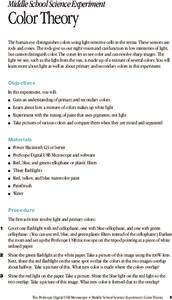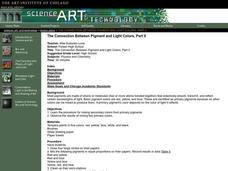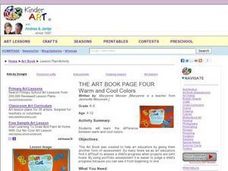Curated OER
Colors, Colors Everywhere
Students mix red, yellow, and blue frosting together to produce secondary colors. Pupils are shown that all colors are made from mixing primary colors of paint together. They discuss the color wheel and spread the "paint" icing on...
Curated OER
Color Theory
Students are able to gain an understanding of primary and secondary colors. They are able to explore about how a mixture of colors makes up white light. Students are able to experiment with the mixing of paint that uses pigments, not...
Curated OER
Color the Snow
Are your teaching in a cold and snowy environment? If so, then try out this fun activity with your class. You mix a variety of colors in large jars to show learners the difference between primary and secondary colors, then let them mix...
Curated OER
Primary and Secondary Colors Mixing Activity
Students explore color recognition through mixing the primary and secondary colors together. They color in an online rainbow using primary and secondary colors, identify the colors on a color mixing poster, then mix the colors using...
Curated OER
Colors
Students learn about the Impressionist painters' use of color and how it connected to early nineteenth century scientific theories about color. In this colors lesson plan, students explore combinations of primary and secondary colors,...
Art Institute of Chicago
Color Combinations
Explore color through an examination of pointillism and light. Class members view Georges Seraut's famous painting on a computer, zooming in and out to see the details and effects of the technique. They then cover how light and color are...
Curated OER
Flipping Butterflies: Triadic Colors and Symmetry
Second graders create symmetrical butterfly wings. In this symmetry instructional activity, 2nd graders observe butterfly wings and create their own. They make both sides symmetrical and mix primary colors to make secondary colors.
Curated OER
The Color of Your Own
Students understand primary and secondary colors. For this lesson about colors, students explore where colors come from. Students paint a picture with the primary paint colors that the teacher has created. Students mix the primary paint...
Curated OER
What is It? Susie Sees!
Students explore the five senses. In this cross curriculum five senses lesson, students view an "I Can See Colors" PowerPoint presentation and sort items by color and shape. Students mix primary color paints to create secondary colors,...
Curated OER
Mondrian - Primary/Secondary Color Study
Utilizing computer software, learners demonstrate the color spectrum. They investigate the life of the artist Piet Mondrian and define his style of artwork. Then they use Photoshop to recreate some of his designs while discovering the...
Curated OER
The Art and Science of Impressionist Color
Discover Impressionist painting as students investigate the 19th century combinations of colors characteristically used. Students experiment with their own paintings, utilizing primary and secondary colors.
Curated OER
Help Wanted: A Lighting Engineer For Popular Rock Group
Young scholars are assigned to groups, and determine each member's role in the group. They will design an experiment to determine a way to produce the three primary and five secondary colors. Students discuss color and mood. They listen...
Urbana School District
Light
You matter, unless you multiply yourself by the speed of light ... then you energy. Presentation covers the behavior of light as both a wave and a particle, light versus sound, space travel, why objects have colors, depth perception,...
Curated OER
Colors: Primary and Secondary
Students explore primary and secondary colors. In this lesson on light and color, students complete four different activities which include mixing colors, creating secondary colors from primary colors and observing the colors in a bubble.
Curated OER
The Connection Between Pigment and Light Colors
Students learn the procedure for mixing secondary colors from primary pigments and observe the results of mixing two primary colors.
Curated OER
Mixing Colors with "Little Blue and Little Yellow"
Students mix colors to make new colors. In this color mixing lesson, students listen to Leo Lionni's Petit Bleu et Petit Jaune, before retelling the beginning, middle, and end of the story. They watch as the teacher mixes food coloring...
Curated OER
Complementary Color Experiments
Students experiment with color mixing and differentiate between primary and secondary colors. They use their observational skills in visual experiments with complementary colors to gain an understanding of the interrelationships of art,...
Texas State Energy Conservation Office
Investigation: Blowing in the Wind
Using a simulated air sample, environmental or earth science pupils examine the components. You will need to prepare the faux air by using a hole punch and various colors of construction paper. Each color will represent a different...
Mr. E. Science
Light
Where does bad light end up? In a prism! The presentation covers light, mirrors, lenses, and the structure of the eye. It also provides explanations of reflection, refraction, concave and convex mirrors and lenses, and a comparison of...
Curated OER
Chromatography Lab
Students discover the components of primary and secondary colors. For this physical science lesson, students create a set up in which water will separate a color into the component colors along a piece of filter paper. Students will then...
Curated OER
Spicy Hot Colors
Second graders investigate the book Spicy Hot Colors. In this colors instructional activity, 2nd graders experiment mixing paint and creating different colors. Students make text to world connections and record their responses and draw...
Curated OER
Colorful Colorado
Students investigate the components of white light as viewed through a prism. The multiple colors of the spectrum produced are related to wavelengths and experienced through the creation of a color wheel.
Curated OER
Color My World
Second graders experiment mixing primary colors to form other colors using frosting.
Curated OER
Warm/cool Colors - Page 4
Students draw pictures that make them feel either warm or cool using only the warm and cool colors.

























